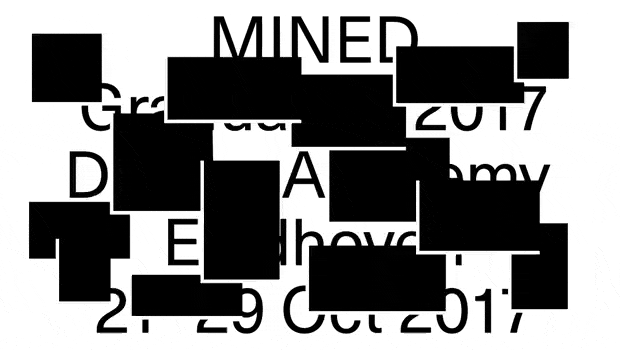Graduation Show 2017
Surrounded by a world full of ‘alternative truths’ DAE’s youngest generation of designers deploys the power of questioning the obvious, and does not shy away from unravelling hidden complexities. MINED, the overall theme of Design Academy Eindhoven’s upcoming Graduation Show, refers to the fundamental research and reflections within the students’ projects. The show visualises how their curiosity, persistence and engagement, coupled with the optimism that is inherent to design, is a key to change. The resources that have been unearthed are as essential to the re-invention of society as they are to each of us individually.
To name just a few:
Kostas Lambridis (MA Contextual Design) modelled his Elemental Cabinet after an 18th-century Italian masterpiece, the famous Badminton Cabinet. Lambridis translated its original structure and execution into a piece of furniture that is just as dazzling, but in a completely different way. The Elemental Cabinet shows the dilemmas of the contemporary designer, forced to choose between a wide array of materials, techniques and finishes. In his reinterpretation of tradition and history Kostas Lambridis doesn’t search for reduction – the Dutch way– but lovingly embraces them all.
Wanting to question the concept of waste, Billie van Katwijk (BA Man and Leisure) went to the slaughterhouse for her project Ventri. Cow stomachs attracted her attention, not only for their inherent properties and beauty, but also because they are neglected and considered litter. Through a laborious tanning-process she transforms them into a range of different leathers. Made into handbags slaughterhouse waste eventually gains a catwalk quality.
Clémentine Schmidt (MA Contextual Design) investigates the blurry domain where physical and virtual realities meet. Her graduation project Performing the Real takes her audience to a strangely familiar, but also distorted world. After having wound yarns around an iconic chair, thus creating a skin for the object, she removed the actual chair. What remains is both virtual and physical: a ghostlike image that depicts our modern condition, in limbo between the analogue and the digital.
Dolled-Up by Ekaterina Galetski (BA Man and Identity) references the Dymkovo dolls that generations of Russian children grew up with. These hand-painted clay figures of people and animals inspired a series of garments and accessories in which Ekaterina Galetski exploits the 2D qualities of the original dolls to experiment with graphic patterns and bright colours. She reinvents the traditional Dymkovo doll as a carrier of a new iconography.
Yildau ter Beek (BA Food Non Food) explored the cultural and social significance of wheat in Syria. Once an agricultural society, that was able to provide for other nations, wheat now has to be brought to the region, bagged and branded by humanitarian organisations. Ter Beek connected with the Syrian community in Amsterdam to learn from their stories. She redesigned the wheat bag, inspired by traditional Syrian textiles to express respect and forge ties between a shared past and future.
Léo Schlumberger (BA Man and Well-Being) redesigns the rituals around a daily routine we tend not to discuss. His project TOILET adapts the concept of a dry toilet to the comforts of a European lifestyle. His project examines our sensory relationship to waste and smell, contemporary habits, taboos, and inconveniences. Material research establishes the basis for a design process in which ecology and ritual meet.
Aram Lee (MA Contextual Design) unearthed the Dutch Wife, a body sized bolster cushion made from bamboo mesh, used as a bed-companion in the former Dutch Indies, now Indonesia. Themes such as colonialism, gender politics and crafts are important ingredients in her contemporary interpretation of the Dutch Wife. The textile objects only start to speak about their sensitive origins after we have first been captured by their beauty.
Irene Stracuzzi (MA Information Design) investigated and mapped the liquid borders in one of the world’s most contested regions, where the concept of mining could be a source of wealth and global conflict: the Arctic regions. Her model of the Arctic regions becomes a projection ground for all kinds of political and territorial claims and treaties.
Friso Wiersma (BA Man & Well-Being) made his installation as a tribute to craftsmanship. His custom woodwork is a stand against modern mass-produced furniture. The finished piece, a cupboard, is made to fit the designers personal body measurements and the tools used by him embody the hands of the maker, his repetitive motions, his attention to detail and his physical relation to the properties of the natural material.
Nadine Botha (MA Design Curating and Writing) reflects on a case of racial discrimination by the Cape Town municipality. Inadequate sanitation services – in the form of portable flush toilets – have been distributed all over the informal urban settlements of Cape Town, causing the so-called Toilet Wars. Her research explores how a camping accessory became a protest totem.
Marie Caye (BA Food Non Food) created SAM, a Symbiotic Autonomous Machine that sells lemonade and is able to autonomously manage recipes, prices, maintenance, service and cleaning labour. We become increasingly dependent on the qualities of autonomous machines, and will have to cooperate with them more and more. But we don’t grant them a legal status as ‘beings’. Why not?
The graduation projects visualise how curiosity, coupled with the optimism that is inherent to design, is a key to change. The resources that have been unearthed during the process are as essential for the re-invention of our society as they are for each of us individually.
